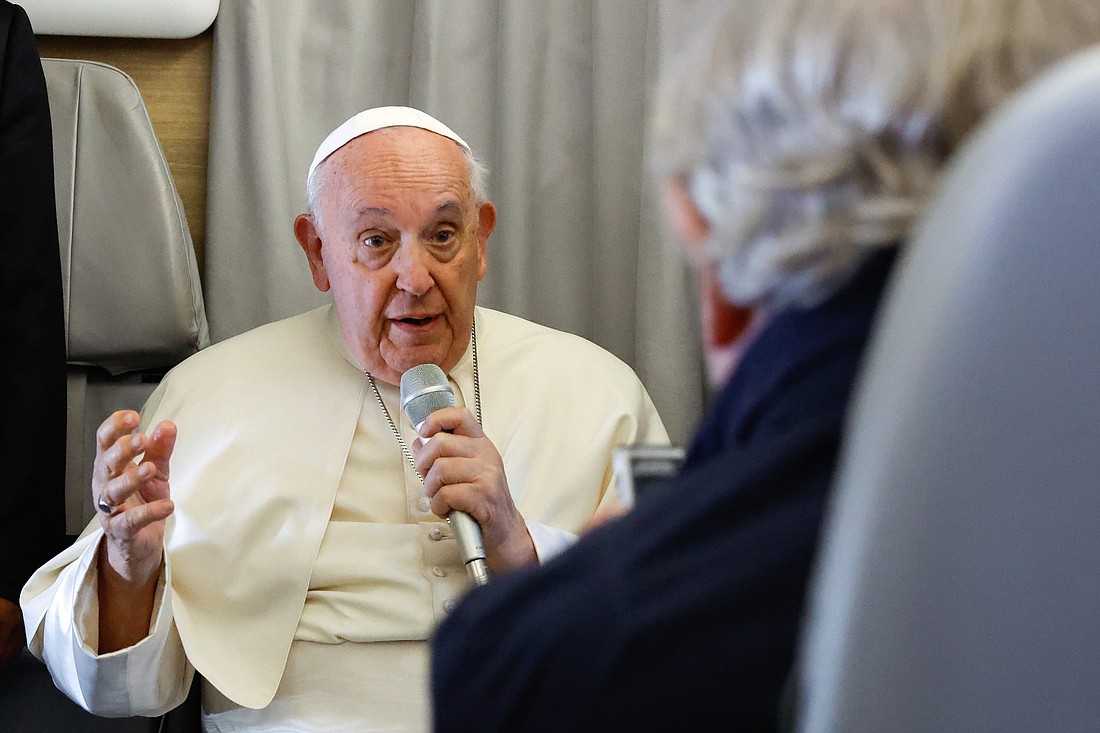Synod assembly won't be secret, but won't be open to press, Pope says
September 6, 2023 at 11:45 a.m.

ABOARD THE PAPAL FLIGHT FROM MONGOLIA CNS – The Synod of Bishops is not a television show or a parliamentary debate, and its discussions will not be open to the public or to reporters, Pope Francis said.
"We must safeguard the synodal climate," the Pope responded Sept. 4 when asked by journalists about access to the discussions at the assembly of the Synod of Bishops Oct. 4-29.
"This isn't a television program where you talk about everything; no, it is a religious moment, a religious exchange," he told reporters flying back to Rome with him from Mongolia.
The synod process began in October 2021 with a succession of listening sessions on the parish, diocesan, national and regional levels focused on creating a more "synodal church," where each person feels welcomed, valued and called to contribute and to share the Gospel.
After so many Catholics around the world devoted their time and their prayers to the process, an initial idea was to livestream the general discussions from the synod hall or at least allow reporters some access.
Pope Francis made it clear on the plane that would not happen. An official summary of the day's discussions – without saying who said what – will be made by the synod's communication committee, led by Paolo Ruffini, prefect of the Vatican Dicastery for Communication.
Beyond the anonymous, summarized points, journalists will try to interview participants to at least get individual points of view about the day's synod work.
Pope Francis told reporters that each synod member – including women and laymen for the first time – would have three or four minutes to address the assembly. Each address will be followed by three or four minutes of silence "for prayer."
"Without this spirit of prayer, there is no synodality, it's just politics, parliamentarianism," he said.
Having a committee summarize the discussions for the press is necessary "to safeguard the religiosity (of the synod) and safeguard the freedom of those who speak" but may not want to do so publicly, he said.
"But more open than that, I don't know," he said. "The commission will be very respectful of the speeches of each person and will try not to gossip, but to recount things about how the synod is progressing that are constructive for the church."
Related Stories
Sunday, December 28, 2025
E-Editions
Events
ABOARD THE PAPAL FLIGHT FROM MONGOLIA CNS – The Synod of Bishops is not a television show or a parliamentary debate, and its discussions will not be open to the public or to reporters, Pope Francis said.
"We must safeguard the synodal climate," the Pope responded Sept. 4 when asked by journalists about access to the discussions at the assembly of the Synod of Bishops Oct. 4-29.
"This isn't a television program where you talk about everything; no, it is a religious moment, a religious exchange," he told reporters flying back to Rome with him from Mongolia.
The synod process began in October 2021 with a succession of listening sessions on the parish, diocesan, national and regional levels focused on creating a more "synodal church," where each person feels welcomed, valued and called to contribute and to share the Gospel.
After so many Catholics around the world devoted their time and their prayers to the process, an initial idea was to livestream the general discussions from the synod hall or at least allow reporters some access.
Pope Francis made it clear on the plane that would not happen. An official summary of the day's discussions – without saying who said what – will be made by the synod's communication committee, led by Paolo Ruffini, prefect of the Vatican Dicastery for Communication.
Beyond the anonymous, summarized points, journalists will try to interview participants to at least get individual points of view about the day's synod work.
Pope Francis told reporters that each synod member – including women and laymen for the first time – would have three or four minutes to address the assembly. Each address will be followed by three or four minutes of silence "for prayer."
"Without this spirit of prayer, there is no synodality, it's just politics, parliamentarianism," he said.
Having a committee summarize the discussions for the press is necessary "to safeguard the religiosity (of the synod) and safeguard the freedom of those who speak" but may not want to do so publicly, he said.
"But more open than that, I don't know," he said. "The commission will be very respectful of the speeches of each person and will try not to gossip, but to recount things about how the synod is progressing that are constructive for the church."










